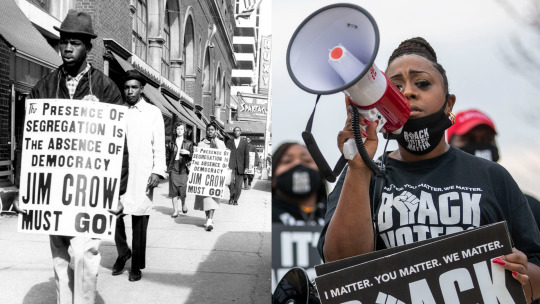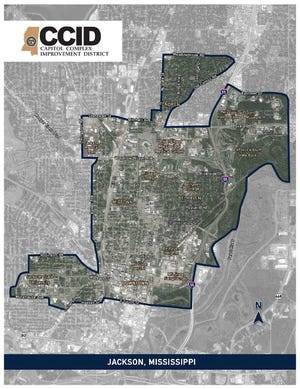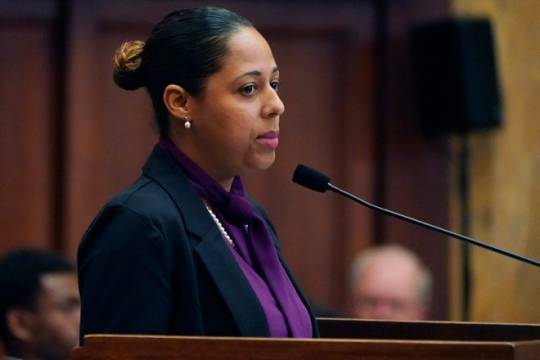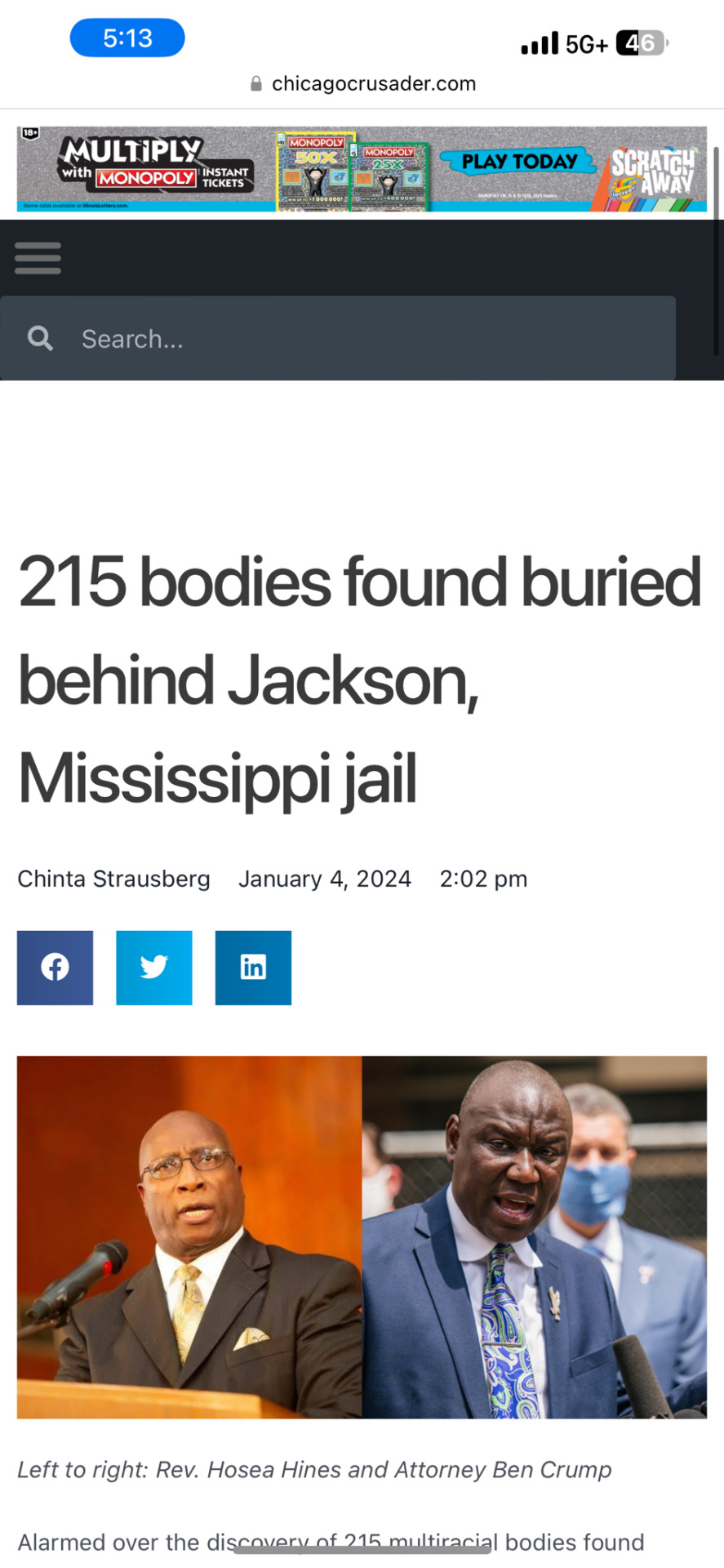#hinds county
Explore tagged Tumblr posts
Text
On September 4, 1875, Republicans in Hinds County, Mississippi, held a barbecue and meeting in the town of Clinton that was attended by 3,000 people. Hoping to curb the risk of violent political conflict, Clinton authorities appointed special police and prohibited serving liquor. When the Republican speakers began making their political speeches in the afternoon, Democratic party representatives unexpectedly joined the meeting and requested speaking time.
In the aftermath of the Civil War, the Republican Party of Abraham Lincoln was the dominant political wing of the federal government working to restore national unity and enforce the new civil rights of Black people, while the Democratic Party largely represented the white South of the former Confederacy intent on regaining control of their state governments. The "Radical Republicans" were an arm of the Republican Party that advocated imposing severe penalties on the South for waging the Civil War and also ensuring full political and social equality for the millions of Black people in the South who were now American citizens.
Political realignment during the civil rights movement of the 1960s led to major shifts in party identification, as Southern elected officials and constituents largely left the Democratic Party in protest of civil rights advancements enacted by President John F. Kennedy and President Lyndon B. Johnson, while the Republican Party stayed silent on civil rights issues to attract the defecting South and later embraced the coded language of "law and order" and "state's rights" to dominate regional politics. But in 1875, Republican politicians in the South—a small minority—were considered agents of federal oppression, friends of African Americans, and enemies of the white supremacy many former Confederates wanted to reestablish.
At the Clinton, Mississippi, barbecue on that September evening, the risk of violent conflict between the political parties was great. In the interest of keeping the peace, Republican officials agreed to accommodate Democrats' request to speak and arranged for a public discussion between Judge Amos R. Johnston, a Democratic candidate for state senate, and Captain H.T. Fisher, Republican editor of the the Jackson Times.
Both speakers were to be given an equal amount of speaking time, and Judge Johnston spoke first. When Mr. Fisher's turn came, he expressed optimism that meetings between the parties could take place peacefully in the future—but eight minutes into his address, an altercation erupted in the crowd. A gunfight between Black and white people in the audience rang out, as bystanders panicked and rushed to escape the danger. Within 15 minutes, three white people and four Black people were dead, and six white people and 20 Black people were wounded.
Though newspapers reported that the Black people who had fired weapons were acting in self-defense, many white observers were enraged by the Black show of force. That night, armed white men from Clinton and Vicksburg formed roving bands targeting Black men. By the next day, an estimated 50 Black people had been killed. Many more had been forced into the woods and swampland to avoid an attack, where they remained until the attack subsided.

#history#white history#us history#am yisrael chai#jumblr#republicans#black history#democrats#Hinds County#Mississippi
2 notes
·
View notes
Text










11 notes
·
View notes
Photo


REPUBLICANS RESURRECTING JIM CROW IN MISSISSIPPISPECIAL TO THE ...MARCH 03,2023
Earlier this month, white representatives in the Mississippi House approved a bill to create a new district—that includes all of the majority-European neighborhoods in Jackson, a capital city that is 83 percent African. This includes creating a criminal justice system for the district, overseen by an all-European power base.
Under House Bill 1020, the white conservative chief justice of the Mississippi Supreme Court would handpick the new district’s two supervising judges; its prosecutors and public defenders would be chosen by the state’s white Republican attorney general.
The zone would be policed by an expanded Capitol Police force, led by the current European police chief, and supervised by the state’s Europan Public Safety commissioner. Because all the district’s officials would be appointed instead of elected, Jackson’s majority-African citizenry would have no voting rights on the matter—making it Mississippi’s only jurisdiction where, according to the ACLU, “unelected judges and prosecutors have jurisdiction over criminal and civil law matters”—although 12 percent of their sales taxes would be redirected to help pay for it all.
“It’s oppressive because it strips the right of African folks to vote,” Jackson Mayor Chokwe Antar Lumumba said, after the bill cleared the House. “It’s oppressive because it puts a military force over people that has no accountability to them. It’s oppressive because there will be judges who will determine sentences over people’s lives. It’s oppressive because it redirects their tax dollars to something they don’t endorse nor believe in.”
youtube
#kemetic dreams#chokwe natar lumumba#lumumba#african#europeans#jim crow#lawyer#hinds county#mississippi#south#racism
25 notes
·
View notes
Text
According to established Mississippi police procedure the police covered up the death and hid the body rather than notify the family.
3 notes
·
View notes
Text
KU KLUX COURT IN 2023 MISSISSIPPI: MS bill 1020 creates separate unelected court system in Jackson district

The passage of House Bill 1020 came in spite some of the starkest possible opposition from Jackson's mayor, its city council and its representatives in the House, many of whom said the bill reminded them of the darkest days of Mississippi's racist past.
After nearly five hours of debate on the House floor the chamber passed the bill that would create an unelected state-appointed court system within the city of Jackson, as conflict between the city and state continues to be one of the key themes of the 2023 legislative session.
The bill passed, 76-38, with only one member of the Jackson delegation supporting it.
More:What legislators said See some of the most explosive quotes from the House debate on unelected Jackson courts
If passed by the Senate and approved by the governor, the bill would create a new court system for cases occurring within the Capitol Complex Improvement District (CCID), an area that could expand.
The bill has faced significant criticism since it was first introduced last month.
Jackson Mayor Chokwe Antar Lumumba, who looked on from the House gallery during the debate, said last week that it "reminds me of apartheid."

The Jackson City Council called a meeting Saturday to vote on a resolution opposing the bill. Every councilmember present, including the sole Republican, Ashby Foote, voted for the resolution.
As Rep. Trey Lamar, R-Senatobia, came forward to propose the bill Tuesday, he seemed to address the news headlines that his bill had made, saying Jackson has a crime problem and a judicial backlog that must be managed.
"I don't know what you've heard, I'll say that, but this bill is designed to help make our capital city of Mississippi a safer city. This bill is designed to assist the court system of Hinds County, not to hinder it. It is designed to add to our judicial resources in Hinds County, not to take away. To help, not to hurt," Lamar said.
Critics, including those elected by the people of Jackson, disagree. They say the bill is not wanted by Jackson residents or leaders within the court and that it dilutes the voting power of Jackson residents, violates the state constitution and does little to address root causes of crime.
"I have not heard that anyone from the City of Jackson, Mississippi who is an elected official is in favor of this," said Rep. Edward Blackmon, D-Canton. "This is a land grab, has nothing to do with crime."

Lamar amended the bill, cutting it from more than 1000 pages down to less than 40 in the process, to remove provisions that would have given the new court sole jurisdiction over lawsuits involving the state.
Blackmon, speaking against that amendment, said the new court would oversee both civil and criminal cases, and that should be a sign to observers that the true underlying issue is not about crime.
"This bill is about helping to fight crime?" Blackmon said. "What does civil litigation have to do with crime in the state of Mississippi?"
If the state was serious about fighting crime in Jackson, Blackmon said, it would increase funding for the state crime lab, which has been cited by law enforcement leaders as a key cause of backlogs.
"I notice that this bill does not address part of the problem, which is lack of funding at that crime lab. You're blaming Jackson because they can't process their cases fast enough because the crime lab is not operating at capacity because we won't give them the money," Blackmon said.
Democrats proposed eight amendments to Lamar's amendment, including ones to make CCID judges elected and to require they be residents of Hinds County. The one amendment that did succeed, proposed by Rep. Cheikh Taylor, D-Starkville, would require Capitol Police officers to wear body cameras. The department's officers were involved in more than a dozen shootings last year.
"This amendment is all about protection, furthering the protection of civilians and also police officers. For those that are in favor of this bill, it does the bill no violence. For those opposed to this bill, it gives further protections to citizens who may be under duress from officers who may not be held accountable because there is no video footage," Taylor said.
After discussions between Taylor and Lamar, language mandating the firing of officers that do not wear the cameras was removed, and the amendment succeeded via vioce vote.
Lamar's response to the amendment to make the judges Hinds County residents, which was proposed by Rep. Robert Johnson, D-Natchez, drew the ire of many of the chamber's Black members.
"If we're going to make an additional court in the city of Jackson, do we not want our best and brightest sitting in judgment, whether that may come from Holmes County or Madison County or wherever they may be? Why would we limit the talent pool to here?" Lamar said.

"What does it imply when you say have a city of 83, that's 83% African American, when you have a statement made from that podium that the desire, the reason you want to go outside of Jackson, is because you want to have the 'best and brightest' in the state?" Blackmon asked.
"What is says to me is, maybe because you've got a Black County with Black judges, maybe they might not be the best and the brightest. Well, I will tell you, I disagree," Johnson said. "They've got the same training, the same education, (and they) probably had to work a little harder to get it."
Hours later, when the statement was brought back up, Lamar said he had been "misconstrued."
"That's not what I'm saying at all. The best person for the job may very well come from Hinds County, and if so the supreme court can appoint that person," Lamar said.
Lamar lives more than two hours away. He repeated a belief from the House floor Tuesday that, as the capital city, Jackson doesn't just belong to the citizens of Jackson.
"The city of Jackson is the capital city of the state of Mississippi, whether you are from Southaven or Gulfport. It is our capital city. It does not belong solely to the citizens of Jackson, OK?" Lamar said.
Lamar said there are already unelected judges serving over cases in Hinds County, but those judges are funded by expiring federal funds from the American Rescue Plan Act, and this is an attempt to more permanently address the problem.
"Why wouldn't you just provide more money to the existing court system to reduce the backlog?" Rep. Zakiya Summers, D-Jackson, asked Lamar.
"Lady, this is the bill that's before the body," Lamar responded.

Summers later pointed out that the current appointed judges are overseen by elected Hinds County judges, and not state officials. She said Lamar's bill would create a "separate but unequal court."
A later question, from Rep. Tracey Rosebud, D-Tutwiler, asked why the legislature should take away authority from Hinds County judges. Lamar said he does not see it that way because the two courts would have concurrent jurisdictions, meaning the Hinds County District Attorney could file cases within the CCID, and CCID prosecutors could file cases within the county courts.
"If the prosecutor wants to indict someone in Hinds County Circuit they still have the ability to do that," Lamar said.
Rep. Christopher Bell, D-Jackson, asked Lamar to name people from Hinds County he had spoken with about the legislation. Lamar said there are several residents he has spoken to.
"Do they look like me?" Bell asked. "You don't have to answer that."
"All God's children are unique. We're all God's children," Lamar responded.
Once Lamar had finished taking questions, it was time for members of the body to speak on the bill. One by one, 12 Black Democrats rose to urge their colleagues to vote no. Other than Lamar, no one spoke in support of the bill.
Blackmon, who recalled being jailed as a younger man for seeking the right to vote, told lawmakers that this moment called back to the state's infamous past.
"Only in Mississippi would we have a bill like this, with our history, where you say solving the problem is taking the vote away from Black people because we don't know how to choose our leaders. That's the problem. And the Trojan Horse that has been brought forward in this bill is called crime," Blackmon said. "I'm old enough to know and understand that the right to vote has not always been ours, and perhaps I'm a little more sensitive to the idea that that vote can be taken away."
Blackmon was one of many lawmakers to claim the bill is unconstitutional.
"This bill is going to pass, make no mistake about it. We'll be back in federal courts again doing what we were doing in the 60s and the 70s, to regain our rights again," Blackmon said.
Rep. Solomon Osborne, D-Greenwood, also thought back to the days of Jim Crow.
Black caucus:How the Mississippi Legislative Black Caucus has changed, served members over the years
Will Jackson lose control of its water?Here's what you should know about state efforts to regionalize the Jackson water system
Mayoral veto bill:Bill saying mayors cannot veto no votes gets initial approval, amid Jackson trash fight
"I've been here for 74 years and one thing I can do is recognize a racist when I see one ... racist actions when I see them, and this is a racist bill," Osborne said, to cheers from those in the gallery, which were quickly gaveled down by House Speaker Pro Tempore Jason White, R-West.
"People come up with all kinds of measures to take away our rights and to oppress the Black Folks in Mississippi. I don't even know why I'm down here, frankly, because it's like being at a Klan rally with people with suits on. That's the only difference I see between these people here. They wear suits rather than sheets," Osborne said. "Every day we get up here and open this body with prayer. I wonder what God are these people praying to?"

"We don’t talk about race because it’s convenient. We talk about race because it’s factual," Johnson said.
Rep. John Hines, D-Greenville, said the legislature needs to do more to support people in need if it wants to see crime decrease.
"If you really want Jackson safe, put the resources in place where we can put mental health services in place, where we can have quality housing for people, where we can insure and where can make so kids got somewhere to go and play and something to do. We ain't doing it. We have not done it at all," Hines said.
Hines went on to say that this action will only reinforce Mississippi's poor reputation on race.
"Again, we end up being the laughingstock of America because of what we do here today," Hines said.
Johnson said actions taken against Jackson stand in stark contrast to what state legislature has done regarding white collar crimes, particularly the massive welfare fraud scandal uncovered in recent years.
"The people who did the wrong were white. Stole $95 million from poor children, and this body hasn't said one time, 'Let's take over that agency and make it work right. Let's take those people out of office, take the power that they have to run that agency and take it and put it in the hands of the legislature so it can be done right.' And the only difference we see is they're white, and the mayor and the city council and the supervisors in Hinds County are Black," Johnson said.
Rep. Earle Banks, D-Jackson, addressed Lamar's comments about to whom the capital city belongs.
"This is your capital city, as many of you say, but this is my home," Banks said.

"I'm going to speak to the citizens and the voters of the city of Jackson. We may lose the battle today, but I want you to know that the people of your Hinds County delegation have been fighting very hard against this bill. The victory belongs to God. We have elections coming up this year. Keep in mind what happens today," Summers said.
As Lamar again rose to the podium following the onslaught of criticism, he promised to keep it brief, noting that every Democrat in the chamber voted to create the CCID in 2017. He flatly denied any racial motivation behind the bill.
"So, I get the fun job of having to close after all that. Where in the world do I start?" Lamar said. "I'm not going to holler and scream and put on a show."
The only member from Jackson to vote for the bill was independent Shanda Yates, whose district includes a small part of Northeast Jackson along with areas in Madison County.
Though it would have cleared either bar, a procedural decision ruled that it could pass by a simple-majority, despite the Legislature's website initially stating it would require a three fifths vote.
It now heads to the Senate. During a January news conference, Republican Lt. Gov. Delbert Hosemann said he could see the bill reaching the Senate floor, though at the time he had not yet read it or spoken with Lamar.
Democrats in that chamber have also vowed to oppose the bill.
#Jackson Mississippi#Voter Disinfranchisement#seperate and unequal#Hinds County#MS bill 1020 creates separate unelected court system in Jackson district
5 notes
·
View notes
Text
A poem dedicated to the 215 (and hundreds more) buried behind a Mississippi jail without their families being notified. Based on current events you can read here or by googling the poem’s title.
1 note
·
View note
Text
Here’s something that the most recent stories have not included: Dexter Wade‘s mother, Bettersten Wade, is currently suing the Jackson Police Department for the wrongful death of her brother in 2019, when an officer slammed him to the ground causing deadly brain injury. The action was so egregious that the officer was convicted of manslaughter. The lawsuit remains pending in state court, though a federal lawsuit was dismissed.
The Jackson Police Department knows this family. They know Bettersten Wade. She has been a thorn in their side seeking justice for her murdered brother. 
The police department and the mayor’s office have tried to characterize the months that Mrs. Wade continued to contact police regularly, begging them to do more to find her son, and during which the coroner’s office had his body, knew who he was and expected police to make a proper death notification, as “miscommunication.”
The county coroner’s office still charged her $250 to “claim“ her son’s body, but it’s still in a pauper’s grave at the county penal colony because the family has to pay for him to be disinterred and reburied in a proper cemetery. The body was not embalmed, and was already in an advanced state of decomposition when it was buried.
This is who police are. Irredeemable. Unconscionable. Killers, liars and corrupt fiends.
HINDS COUNTY, Miss. (WJTV) – A Mississippi man who died after being struck by a police SUV was buried in a pauper’s cemetery without his family’s knowledge – despite having his state identification card in his pocket, civil rights attorney Ben Crump alleged Thursday.
Crump claimed that the exhumation of Dexter Wade’s body and discovery of the ID, which had his home address on it, as well as a credit card and health insurance card, indicates a serious effort to cover up how Wade died.
Crump confirmed to The Associated Press that the address on the ID card matched the address of Wade’s mother, Bettersten Wade, who said she didn’t learn of her son’s death until months after he was buried.
438 notes
·
View notes
Text
There's a young raccoon stumbling around the neighborhood making rrrrrr noises and flopping over and rolling like it can't control its rear legs. It's been out all day, but because it's 4th of July, when I called animal controls after-hours line, they just told me they don't do anything on holidays so we can only call them if it's still around by 8:30 tomorrow morning.
So if it's rabid, fuck us I guess? Cute lil guy though.


#seriously wtf#i hope he just has some kind of congenital issue with his hind end or something#but how can the county just. not have any option whatsoever in case there's actually rabies involved here#this guy should not have been wandering around alone in daylight#he's very young and that's just not normal behavior#raccoon#illinois wildlife#do not fuck around with rabies goddamn
10 notes
·
View notes
Text

A photograph of people looking over at Keem Strand on Achill Island, Co. Mayo Ireland by John Hinde. Hinde's iconic images of Ireland were used on postcards and in tourist books and were very popular.
Source: https://twitter.com/Memoire2cite/status/1620002696580456449?s=20&t=4EWsuFh1FnHWRxgEkKg72A
3 notes
·
View notes
Text
Behind Jackson, Mississippi Jail, 215 Bodies Found In Unmarked Graves
This area of land is utilized to covertly bury 215 prisoners who have passed away in Jackson, Mississippi, without conducting an inquiry or informing their relatives. In Jackson, Mississippi, a terrible scenario is developing after 215 dead were found in unmarked graves outside a state prison. The relatives of individuals laid to rest in the “pauper’s field” behind the Hinds County Penal Farm…

View On WordPress
#Bettersten Wade#Breaking News#Dexter Wade#graveyard#Gretchen Hankins#Hinds County Penal Farm#Jackson Mississippi#Jonathan Hankins#Latest#Marquita Moore#Marrio Terrell Moore#Pauper’s field#Trending#Trending News
0 notes
Text



June 1937, Hinds County, Mississippi.
"Cotton rules the world," says this fifty-seven year old sharecropper woman. Thin dimes around the ankles to prevent headaches. Black beads hung between the breasts are good for heart trouble.
472 notes
·
View notes
Text

Roland L. Freeman, The Divinity Family, Hinds County, Mississippi, 1976
490 notes
·
View notes
Text
2nd Soros-funded Hinds County DA charged with crimes while in office
38 notes
·
View notes
Text
1 note
·
View note
Text
JACKSON SAYS BACK BACK WE GOT THIS: Jackson city leaders pass resolution opposing House Bill 1020, calling the bill racist and disrespectful
JACKSON, Miss. (WLBT) - House Bill 1020 continues to receive a lot of backlash. This time from the Jackson City Council.
During a special called meeting on Friday, the council passed a resolution saying they oppose the bill.
The council also voted to give a copy of the resolution to every lawmaker in the House and Senate.
Under this bill, the Mississippi Supreme Court would appoint judges to hear civil and criminal cases in the Capital Complex Improvement District.
The legislation would also expand CCID to County Line Road.
The bill states the Attorney General’s Office would be responsible for appointing prosecutors to take on these cases, and public defenders would work underneath the Mississippi Public Defenders.
City leaders question the timing of this proposed takeover, calling the bill disrespectful and racist.
“I am in favor of trying to keep Jackson safe, but not this way,” said Councilwoman Angelique Lee, who represents Ward 2. “I’m also opposed to how the boundaries are drawn. It appears racist on its face, and it is not equally representative of the citizenry Jackson, Mississippi, which is majority black.”
“People of Hinds County, city of Jackson have their rights, and their rights can’t be taken away, won’t be taken away without a fight,” said Councilman Vernon Hartley, who represents Ward 2.
“At the end of the day, we have to deal with the culture that is at that State Capitol, which is, the city of Jackson has their own Representatives, their own elected officials, let them deal figure this stuff out, and if they can’t do it we’ll come in and take over,” said Councilman Aaron Banks, who represents to Ward 5. “At the end of the day, all of this is about them wanting to take over and put their own district within the Capital City of Jackson, and this is our home. Instead of embracing us, they just want to takeover, and we oppose that.”
City leaders held a press conference immediately following the council meeting, showing a unified front that they all disagree with this bill.
“A lot of these bills that affect our city are being introduced without any input from the people who actually live here and the elected representatives that serve with the other members of the legislature,” said Senator Davis Blount, who represents District 29, which includes Hinds County. Lawmakers have until February ninth to vote on this bill. If it doesn’t come up for a vote by that time, the bill will die.
#Jackson city leaders pass resolution opposing House Bill 1020#calling the bill racist and disrespectful#Jackson Mississippi#separate and unequal in 2023#Hinds county#Black Votes Matter#Ward 5
3 notes
·
View notes
